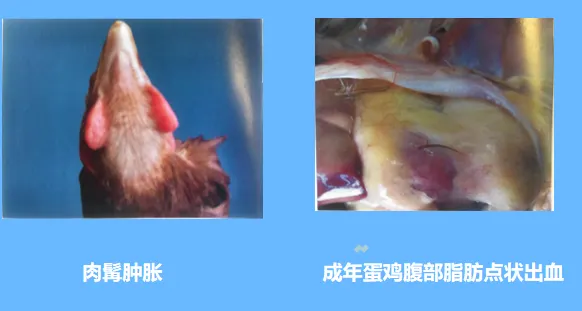Chicken Diseases and Treatment - Fowl Cholera
(1) Clinical symptoms
The incubation period of this disease is 2 to 9 days, and it is divided into the most acute type, acute type and chronic type.
1. Most acute type
It is common in chickens at the peak of egg production, with almost no symptoms and sudden death. Dead chickens are usually found in the morning.
2. Acute type
Some cases are transformed from the most acute type. Sick chickens are mentally exhausted, with ruffled feathers, difficulty breathing, and a large amount of mucus mixed with foam from the mouth and nose; the comb and wattle are cyanotic, the meat is edematous, hot and painful; severe diarrhea, light yellow-green feces, body temperature rises to above 43℃, and most of them die within 1 to 3 days, and the egg production of laying hens decreases or stops.
3. Chronic type
It is usually prevalent in the late stage of the disease or transformed from acute cases, or caused by infection with less virulent strains. The course of the disease can last for several weeks, and finally death occurs due to exhaustion. The chicken's bun, comb, and ear pieces are swollen and necrotic, the follicles are swollen, the follicle secretions increase, the secretions have a special odor, the joints are swollen and suppurated, movement disorders, diarrhea, etc. In addition to systemic symptoms, turkeys show symptoms such as shaking their heads and necks, breathing with open mouths, rales, a large amount of fluid flowing out of the mouth and nose, and loose feces. They die in 1~3 days.

(2) Pathological changes
1. The most acute type
The course of the disease is short, death is rapid, and pathological changes are usually not obvious. Some dead chickens have purple-red or purple-black combs and quills, hemorrhages on the epicardium, and pinpoint gray-yellow or gray-white necrotic spots on the surface of the liver. Laying hens often have "holding" eggs, and there are often intact eggs in the oviduct.
2. Acute type
The subcutaneous tissue, fat, mesentery, serosa and mucosa have bleeding spots of varying sizes. Pericardial effusion is mostly light yellow or yellow-red clear liquid (this is similar to chicken pericardial effusion syndrome), sometimes mixed with cellulose flakes, etc. The coronary sulcus, epicardium, endocardium and myocardium are congested and hemorrhaged. In severe cases, there are diffuse bleeding spots on the surface of the heart and coronary fat or they merge into bleeding spots of varying sizes. The liver is enlarged and brittle, purple-red, brown-yellow or brown-red, with gray-yellow or gray-white necrotic spots on the surface ranging from the tip of a needle to the size of a needle, and sometimes with punctate bleeding. The trachea is congested and hemorrhaged, with mucus inside; the lungs are congested, hemorrhaged, and edematous; there are fibrinous or cheesy gray-white exudates in the chest cavity, abdominal cavity, air sacs and intestinal serosa. Muscular stomach bleeding; the intestines are catarrhal and hemorrhagic enteritis, the intestinal mucosa is congested and hemorrhaged, the contents are mixed with blood, and some mesentery is covered with yellow cellulose-like substances.

3. Chronic type
When respiratory symptoms are severe, there are a lot of viscous secretions in the nasal cavity, trachea and bronchi, the lung texture is slightly hard, and the turkey has pneumonia changes.
The wads are edematous and necrotic, with cheesy exudates. When arthritis occurs, the joints are swollen and deformed, the joint surfaces are rough, the joint capsules are thickened, the red or grayish yellow viscous joint fluid increases, and there are inflammatory exudates and cheesy necrosis (this is similar to synoviae infection, synovitis-type Escherichia coli disease, and viral arthritis). Ovarian congestion and bleeding, yolk peritonitis, etc.
Phone:+86-19138056813
Tel:+86-0371-88959050
Email:info@zsybio.com
Address:Zhengzhou City, Henan Province, China